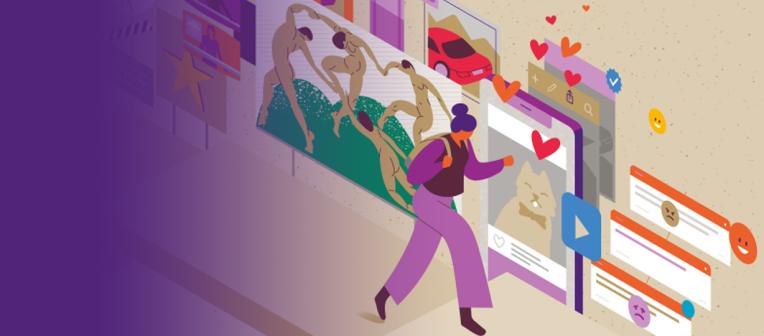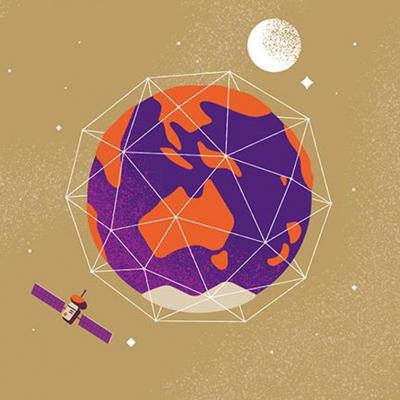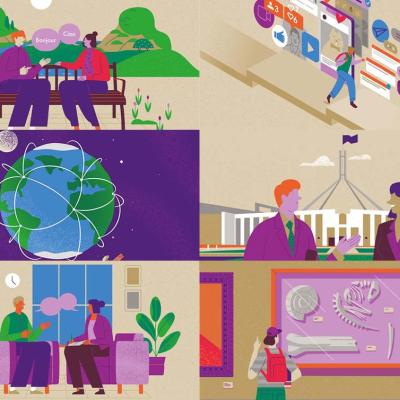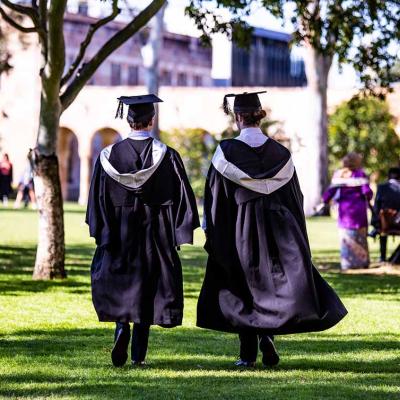You’ve probably heard rumours about Bachelor of Arts graduates struggling to find employment. But the reality is actually quite the opposite.
We’re here to bust some myths and reveal the truth about where an arts and humanities degree can take you. Let’s see what the data has to say about those false stereotypes and misconceptions.
Note: Aside from our own data, the statistics featured below are sourced from the Academy of Social Sciences in Australia, Quality Indicators for Learning and Teaching 2022, the National Skills Commission, and the Australian Academy of the Humanities.
Myth: “Arts and humanities graduates don’t get jobs.”
Actually, they do – and good ones, too. Two thirds of Australia’s workforce is filled by humanities and social sciences graduates, and 87% of recent graduates in humanities, culture and social sciences are employed.
In 2022, UQ Bachelor of Arts alumni were working at over 6,800 organisations across the world, including governments, higher education institutions, and private companies.
Myth: “Successful people don’t do arts degrees.”
Emma Watson. Simpsons creator Matt Groening. Barack Obama (and Michelle as well). These are just some of the countless successful people who studied arts and humanities at university.
In fact, 66% of chief executives in ASX200 companies, 66% of federal parliamentarians and 62% of government senior executives have a degree in humanities.
Fun fact: 4 of Queensland’s premiers studied their Bachelor of Arts at UQ – Steven Miles, Annastacia Palaszczuk, Anna Bligh, and Peter Beattie.
Myth: “Arts graduates don’t make any money.”
On average, a humanities, culture and social sciences graduate fresh out of uni will earn $66.7K per year in full-time employment. And, naturally, that number should increase as you develop your skills, gain experience, and take on new roles.

An arts degree can also lead you into almost any industry, which means you can pursue what you’re passionate about. This gives you the ability to build a career that’s truly rewarding – both mentally and financially.
It’s also worth noting that your career is unlikely to follow a straight line down a narrow industry corridor. Life can be surprising and unpredictable. This makes an arts degree even more valuable, because it equips you with the portfolio of skills and capabilities to adapt across different disciplines, no matter where your future takes you.
Myth: “Arts degrees aren’t valued by employers.”
Quite the opposite. Around 75% of employers say that employability skills (or ‘soft skills’) are just as important – sometimes more important – than technical skills. And developing these very skills is an integral component of the Bachelor of Arts.
Employability skills include things like problem solving, critical thinking and communication. Data says these will be of prime importance to employers in 2030 and beyond.
Myth: “There’s no future in the arts and humanities.”
It’s true that AI algorithms are doing some impressive things. But they’re not replacing diplomats, directing films or writing (good) novels just yet.
There’s no replacement for human ingenuity, and that ingenuity will continue to be valuable to organisations for the foreseeable future. In fact, the top 5 sectors that employ humanities graduates are all projected to grow substantially in the coming years. These sectors are:
- Education and Training
- Public Administration and Safety
- Professional Scientific and Technical Services
- Healthcare and Social Assistance
- Arts and Recreation Services.
So, if the Bachelor of Arts is something you’re considering, we hope none of these persistent myths are getting in your way. Arts graduates can achieve amazing things and create rewarding, meaningful careers for themselves – and we can’t wait for you to do the same.





